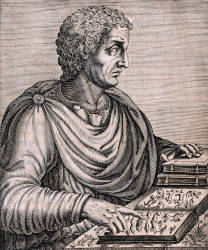Gaius Plinius Secundus
Pliny the Elder (circa AD 23-79)


Gaius Plinius Secundus was a famous Roman scientific encyclopedist and historian. He surveyed all the known sciences of his day, astronomy, meteorology, geography, mineralogy, zoology, and botany. Most of his works are lost, but his book Historia naturalis (Natural History) still exists. No single work of Pliny still exists, but many of them were copied, complete or in excerpts, multiple times. So today numerous copies of many of his works exist, which gives some security that they are authentic.
Plinius was born in Como, studied in Rome and then became soldier, which was a typical career for a Roman aristocrat. He became a cavalry commander in Gallia (France) and Germania (Germany) and a friend of Vespasian. During the reign of Nero he was in foreign countries, which kept him out of harm’s way. After Nero died, his friend Vespasian was made emperor in AD 69. So he returned to Rome and took up various public offices.
He finished Historia naturalis probably in AD 77, and he states that he has covered 20,000 subjects of importance drawn from 100 selected writers, to whose observations he has added many of his own. To Plinius the world consisted of four elements: earth, air, fire, and water. This world view persisted for 1,500 years, and some people still believe it. It was a basis of the alchemy of the Middle Ages. He postulated the earliest theory of gravity, light substances were prevented from rising by the weight of the heavy ones, and vice versa. He made a model of the solar system, the Earth surrounded by seven stars, the Sun, the Moon, Mercury, Venus, Mars, Jupiter, and Saturn. Since the Moon obscured the Sun during an eclipse he thought it was larger than the Earth. But the sciences which interested him most were botany, agriculture, and horticulture. And although many of he theories later proofed to be wrong, his work is of an immense value. He invented important basics of science and influenced generations of scientists.
He died as a scientist in AD 79 during the eruption of the volcano Vesuvius. He was in command of a fleet in the bay of Naples. There are two versions of his dead. The heroic one tells he was going to take a closer look, and then was killed by poisonous fumes. The other says, that he died because of a heart attack, caused by arteriosclerosis and fastened by his asthma and the stress and strenuousness of the rescue operation.
To his honor this type of eruption of Mt. Vesuvio, which injects lots of ash into the air and sends ash flows down the slope of the volcano, is today called plinian eruption. Its typical sign is a cloud going straight up into the sky and then, when reaching a layer of the same dense, is blown horizontally by the wind. The result is a sort of L shaped cloud.
Biography
| 23 | born in Como. |
| 77 | wrote Historia naturalis. |
| 24-AUG-79 | died in the eruption of Mt. Vesuvio. |
Bibliography
- Gaius Plinius Secundus (77):
Historia naturalis,
- See also
 Search DuckDuckGo for "Pliny Elder Historia Naturalis"
Search DuckDuckGo for "Pliny Elder Historia Naturalis" Pliny the Elder at Wikipedia.
Pliny the Elder at Wikipedia. Pliny the Elder, (Gaius Plinius Secundus)(c. AD 23-79)
Pliny the Elder, (Gaius Plinius Secundus)(c. AD 23-79) Wofford Library: library entry of a sixteenth century imprint of Natural History.
Wofford Library: library entry of a sixteenth century imprint of Natural History. Plinian Eruption, USGS photo glossary of volcano terms.
Plinian Eruption, USGS photo glossary of volcano terms. C. Plinius Secundus maior - opera, the Latin original.
C. Plinius Secundus maior - opera, the Latin original. C. Plinii Secvndi Opera Latin transcription of the first 5 chapters.
C. Plinii Secvndi Opera Latin transcription of the first 5 chapters. Gaius Plinius Secundus, der Ältere - biographische Anmerkungen (
Gaius Plinius Secundus, der Ältere - biographische Anmerkungen ( )
)
 Index
Index Topics
Topics Hierarchical
Hierarchical Countries
Countries Maps
Maps